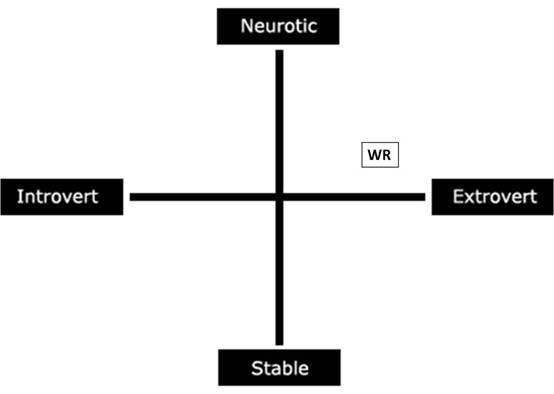Personality theories
There are many different theories within psychology to explain personality and how it has an effect on sporting performance. Here are some of the theories.
Trait theory
It is suggested by Trait theorists such as Eysenck and Cattell that an individual has core personality characteristics which are the same in different situations. The reason for this is that they are born with their characteristics and the stay the same for the rest of their lives. For example a footballer who is aggressive on the pitch will be aggressive off the pitch.
Eysenck and the trait theory
Eysenck suggests that personality is a two dimensional scale
- Introvert...............................................................Extrovert (Extroversion scale)
- Unstable (Neuroticism).....................................Stability (Neurotic scale)
Some examples of the extremes of the two scales are shown below. In reality most people are not at the extremes of the two scales, but somewhere along them. The scales a represented in graph form as seen below. Each athlete will lie somewhere between the introvert/extrovert scale and the unstable/stable scale.
Eysenck's Personality Inventory
This is used to determine the personality of an individual.
As you can see Wayne Rooney (WR) has been placed on the scale as extrovert/neurotic (unstable). This means he is an extrovert, but can be unstable in his approach to play (see the table below). Wayne Rooney has been placed as extrovert as he plays a team sport and enjoys communicating with the team and is a confident individual. He has been placed as quite neurotic as sometimes he can lose his temper which can lead to aggressive behaviour.
Wayne Rooney may not always fall in to this category, however, from the characteristics that are seen we could place him as above. This means that sometimes he can be introvert and sometimes he can be stable. For example there are many games where Rooney has no issues with uncontrolled aggressive behaviour.
Understanding an athlete's personality can be very important to a coach when putting a team together; having a team full of confident loud players who always want to be the leader can cause friction between the team. On the other hand if the team is all quiet individuals who lack in confidence there may be no-one who takes the lead to winning. Therefore a team needs to have a mixture of personalities.
The table below breaks down the four types of traits providing some example characteristics for each one.
| Trait | Example |
|---|---|
| Extrovert | Sociable, outgoing, talkative, easygoing, lively, leadership |
| Introvert | Quiet, unsociable, anxious, moody |
| Stable | Calm, reliable, controlled, peaceful, thoughtful, careful, |
| Unstable | Touchy, restless, aggressive, changeable, active |
